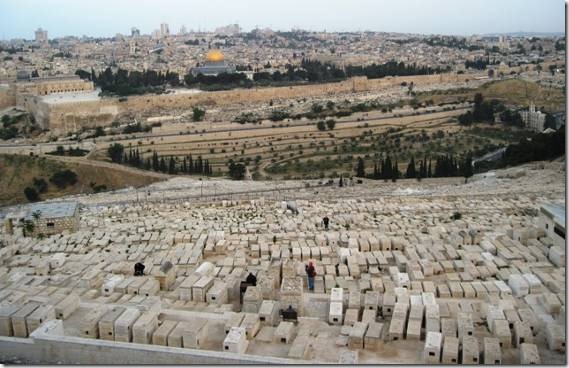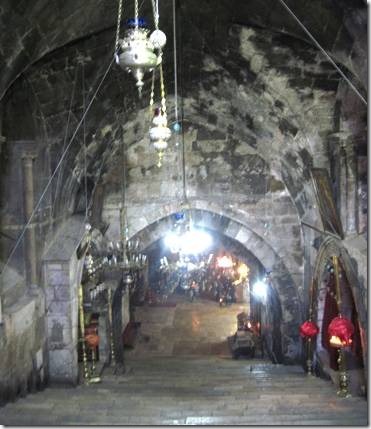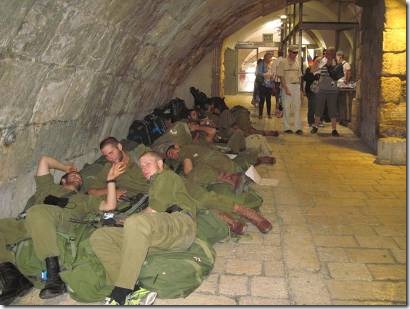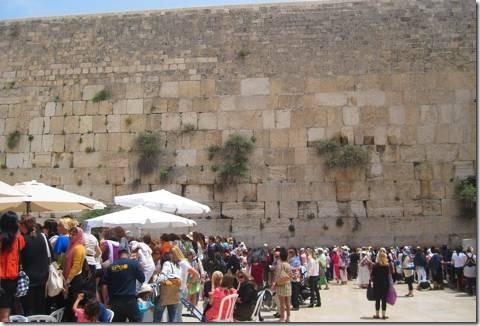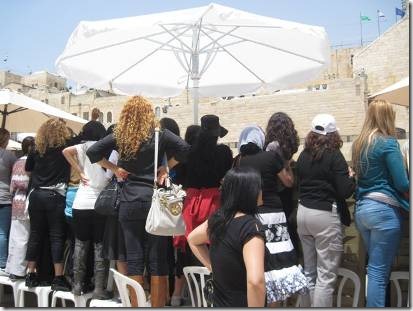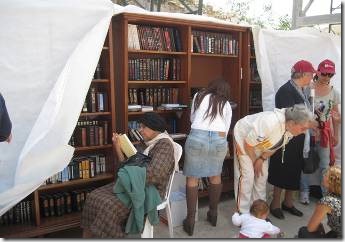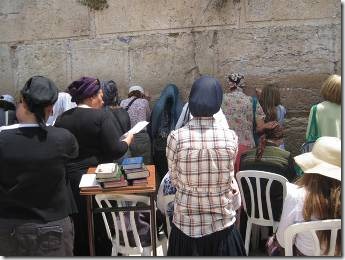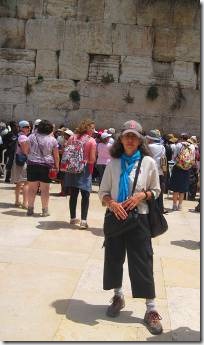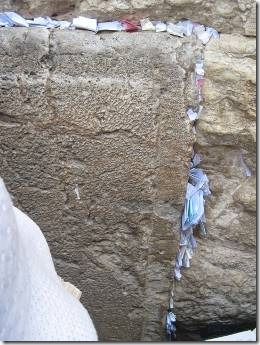Shalom,
Living in Israel the only clothing issue is whether or not it makes one look fat. It’s sort of anything goes here unless you visit Jerusalem or other "holy" places and then arms, legs, and heads need to be covered. The heat is actually the biggest clothing issue and dealing with all my hair. Wonder if it will survive?
Yesterday was International Museum Day so we took advantage and went to the Beit Ha-Tefutsot (Diaspora Museum) and the Erets Yisra’el Museum. Randal and I also visited the Palmach Museum (not free) though I got a senior discount being over 60, but not Randal as men have to be 65. Nilly Bukchin had told us about the "free day" and had recommended the Diaspora Museum. It’s a wonderful museum on the University of Tel Aviv Campus and we all really enjoyed it. Tickets are usually 70 NIS ( new Israel shekels ) or about $18 per person. Not sure if there would have been a senior discount. When we visited the Apollonia National Park we were told only Israeli citizens qualified for the discount. Anyway, lots happening though we rest on Sabbath as public transport doesn’t run and we don’t have a car yet. We are leaving for Eilat and Petra Sunday for a few days. We’ll rent a car first thing Sunday morning and take off. It’s about 280 miles from here to Eilat where we’ll stay over night. Then we’ll get ourselves to the Jordan border and across to Petra where we’ll stay overnight. Then back to Eilat for the night and then start back to Herzliya.
I chose, first, to write about our visit to the Western Wall because I was truly surprised at how being there created very unexpected feelings of being part of something larger than myself, and part of a very long story. Just being in Jerusalem in general is quite an amazing experience, though I honestly don’t know why it feels that way. I think lots of it comes from being surrounded on all sides by ancient stone; either underfoot or overhead or walls of buildings. I certainly am not the least bit religious or observant though being car-less in the marina, we are “forced” to observe Shabbat because shops close and public transport stops. The marina gets busy as locals come Friday afternoon to spend the Shabbat on their boats. Most boats here in the marina are not owned by “live aboards” but rather by locals with homes and jobs on land. There is no “morning cruisers net” or pot-luck activities. There are lots of “Birthday Boats” with singing kids and family outings. Everyone is friendly; but it’s different.
It is very comfortable for me in Israel. In many ways, it’s just like Brookline, Massachusetts or parts of New York, only we can’t read the labels on most of the food in the market. Food shopping was actually easier in North Cyprus where most was done at the Monday Open Market or the Yenierenköy butcher. The grocery store at the marina mall is just like a supermarket at home but all in Hebrew.
Being a capital L Liberal Democrat, I also am less tolerant of rudeness or intolerance so being here will definitely be an interesting experience as this email will show. I started out just researching the Western Wall (what we called the Wailing Wall at home) but turned off onto the issues of women’s rights. You just never know where you’ll end up when you start my emails. I certainly didn’t when I started writing.
Ru
The view from our hotel on Mount Olive looking down on the Jewish cemetery and the Dome of the Rock and the Muslim quarter off in the distance.
We did a quick 2 hour tour of Jerusalem and my photos aren’t that great. We’re planning to return on our own towards the end of the month and I’ll take more photos at that time. But this was my favorite view. I’d gotten up early and was out by 6 am for sunrise and to walk down the mountain to the Garden of Gethsemane and a small cruciform underground church which is where Mary was said to have been laid to rest. I could have sat for a while listening to a nun chanting but had to be back for breakfast and ready for our 8:30 am tour.
Tomb of the Virgin
“The tomb of the Blessed Virgin is venerated in the Valley of Cedron, near Jerusalem. Modern writers hold, however, that Mary died and was buried at Ephesus.” http://www.newadvent.org/cathen/14774a.htm
We visited Mary’s House in Ephesus, Turkey. I’d read Sue Monk Kidd and Ann Kidd Taylor’s book Traveling with Pomegranates in which Sue writes a great deal about Mary as a woman and as an “ear for women’s prayers.” If you could meet people from past times, I think Mary would be an interesting person to meet (if that isn’t a huge understatement.)
The Western Wall
The Western Wall is the only accessible remnant of the Jewish temple that the Romans destroyed in 70 A.D. Israel recognizes it as a synagogue, governed by Orthodox tradition with separate areas for men and women. http://www.therepublic.com/view/story/womenwall-faith/womenwall-faith/
“What craziness guides the thinking of supposedly sane men, who blindly follow what they misconstrue to be God’s wishes? How long will the politicians endorse extremism and tolerate hate?”
Rabbi Joshua Hammerman http://womenofthewall.org.il/in-our-own-voices
Rabbi Hammerman isn’t speaking about world news events; he’s speaking about the regulations governing who can do what when visiting the Western Wall.
You go through security and a tunnel to get to the Wall.
Everywhere in Israel you see young people in green military uniforms as military duty after high school is compulsory for most except the very Orthodox and Conscience Objectors.
So anyway, it was Thursday, which, along with Monday, is one of the days Bar Mitzvahs take place at the Wall. So there was more of a crowd than usual.
The Women’s side.
Women peeking over the wall of the “much smaller women’s section” into the “large men’s section” where Bar Mitzvahs take place.
5/12/2010
Question: Can we celebrate a bat mitzvah at the Western Wall in the Kotel Tunnels or any other attractive site? What are the alternatives for girls?
Answer: Greetings,
Celebrating a bat mitzvah at the Western Wall is one of the more difficult issues that we deal with here, at the Western Wall. As opposed to the bar mitzvah which includes reciting the blessings for the Torah reading, putting on phylacteries, the bat mitzvah is neglected.
The Western Wall grants a certificate but we don’t have an appropriate ceremony. You have the option to coordinate a tour of the Kotel Tunnels (there is an option for the bat mitzvah girl to guide it herself with proper preparation with a bar mitzvah guide) or the Generations Center.
Mazal tov,
The Western Wall Heritage Foundation. http://barmitzva.thekotel.org/faq.asp?lang=en&currpage=4
So all of there answer = NO.
My sister and I and all of our friends had a Bas Mitzvah. But they were held on Friday night with 3 or 4 girls together and didn’t involve the Torah. Boys were Bar Mitzvah on Saturday morning and each boy had his own. Now, I think things are different.
There were prayer books available.
And women were praying just as intensely as men.
I found myself crying..have no clue why. Maybe thinking that after everything that tried to destroy the Jewish people, we still exist.
(Or maybe thinking about how terrible the Red Sox are doing and it’s ok to combine the two thoughts as I’ll explain in a later email about Masada.) I did write a message and push it into the stones.
Out of curiosity I typed “women at the Western Wall” into Google because the wifi here is too slow to use my Roanoke County Public Library’s magazine datebase. I found an National Public Radio story so knew I could trust what I was reading!
Jewish Women Fight For Equality At Jerusalem Western Wall
July 30, 2010
Israeli law prohibits women from reading the Torah at the Western Wall in Jerusalem, one of Judaism’s most sacred spots. Anat Hoffman wants to change that. She’s the chairwoman of Women of the Wall and a leading figure in the Reform movement in Israel. Earlier this month she was arrested for carrying the Torah at the wall. Hoffman tells guest host Rebecca Roberts about the incident and why she is so steadfastly working to upend the gender-based restrictions.
Copyright © 2010 National Public Radio®.
REBECCA ROBERTS, host:
Next to TELL ME MORE’s weekly conversation, Faith Matters, when the focus is on matters of faith and spirituality. Today we continue our occasional series on women and faith with a story about Judaism’s most holy site, the Western Wall in Jerusalem. Thousands of Jewish pilgrims visit the sacred spot, also known as the Wailing Wall, every year to pray and reflect.
But Israeli law imposes limits on the way women can express their faith at the stone structure a remnant of the ancient site of the original Jewish temple. For years, a debate over that law has raged among Jews and Israel and around the world. Many call the restrictions antiquated and sexist. Others deem the rules necessary to uphold orthodox values.
Earlier this month, reform activist Anat Hoffman, who leads a group called Women of the Wall, intentionally defied the rules, openly carrying a Torah, although not reading from it, near the wall while leading a procession of women in song. Israeli police arrested Hoffman. She was fined and banned from the wall for a month.
Ms. Hoffman joins us now from our New York bureau. Welcome to TELL ME MORE.
Ms. ANAT HOFFMAN (Reform Activist, Women of the Wall): Yes, shalom. Millions come to the wall every year, thousands a day.
ROBERTS: And when you visited on July 12th, did you intend to get arrested?
Ms. HOFFMAN: I intended to challenge the powers that be on an issue that was not yet clear. We were carrying the scroll to the wall for the last 21 years, except we always carry it in a duffel bag. In the last eight months, the chief of police has decided, without any explanation, to confiscate the Torah scroll from us as we enter in the morning and stash it in the back of his car. We found that not very respectful of the book and of the whole location.
And we decided that as there are 200 Torah scrolls in the men’s side, completely available for free to men’s use, and ours is the only one for women’s use, we decided that we will carry it outside the duffel bag holding it in our arms. That caused the police to be worried about safety and security because the bullies, the ultra-orthodox bullies at the wall might attack the women for holding a Sefer Torah.
ROBERTS: Well, we should clarify that that it’s not against the law of the Israeli Supreme Court. It challenges the traditional norms of the ultra-orthodox.
Ms. HOFFMAN: The supreme court ordered that women cannot read from the Torah at the Western Wall. Women were allocated to the tune of almost six million shekel in an alternate site. You in America know this as separate but equal. We were given another wall. Why? There are many walls in Jerusalem, why stick to this one? There’s a wall in my house. I’m surprised the Israeli government didn’t, in its benevolence, didn’t order that I would pray in my own living room.
We were given another site. I was walking with a Sefer Torah from the site where I’m forbidden to read to a site where I’m allowed to read. The court did not give an opinion over carrying a Sefer Torah. I run an organization, the Israel Religious Action Center, which is the legal and political arm of the reform movement. I have many lawyers.
And I came armed with quite a few legal opinions saying that carrying the Torah is legal. However, the wild card here is violence. It’s because of violence that the police decided to take me to prison and not stop some of the people who are attacking. Instead of dealing with the bullies, they deal with the minority.
ROBERTS: By bullies you mean the ultra-orthodox?
Ms. HOFFMAN: Ultra-orthodox men and women who decide that they will enforce their way of belief at the wall by using violence.
ROBERTS: Now, the publicity from your arrest is highlighted, but could be a significant rift between the direction of Jewish law in Israel and the diaspora, particularly here in the U.S. You’re in the U.S. now, what role do you think American Jews play in this debate?
Ms. HOFFMAN: This is an excellent question. I just want to add one more thing. Most Israeli Jews are not orthodox either. Not Israeli Jews, not Jews in the diaspora, the orthodox are a minority in the Jewish world. And yet they dictate life choices in Israel not just at the Wall. At the Wall, it’s very pronounced, but it’s in the issues of conversion, of burial, of marriage and a variety of other issues.
Segregated buses in Israel. I don’t know if you’re aware that there are 106 segregated buses run by our state bus company, where women are assigned to the back and men to the front. There are 2,500 rides like that every day. We’re in the supreme court challenging this, representing orthodox women. It is orthodox women that are objecting to the segregated buses.
And let me tell you another thing, the Women of the Wall are in the majority, orthodox women. The most courageous feminists I know are orthodox women challenges orthodoxy from within.
ROBERTS: And where do you think you mentioned a conversion law which is a debate that has been postponed but not taken care of. That is a debate particularly that American Jews have gotten involved with. Where do you think this is headed? What role do you think is going to form between the diaspora and the ultra-orthodox in Israel?
Ms. HOFFMAN: Well, hopefully that is my wish is that Jews all over the world will understand that Israel is way too important to be left to the Israelis.
ROBERTS: If Israel’s too important to be left to the Israelis, who should it be left to?
Ms. HOFFMAN: I think the Jewish people have to discuss, what are the values? What are Jews’ values that govern a sovereign Jewish state? What are these values? Are these values of tolerance, of pluralism, of openness, of equality or the opposite of that? And I think the Jews of the world have a voice in this. And I’m delighted that with the unfortunate conversion bill but we heard that voice. The giant has awakened. Jews from Australia and Jews from Europe and Jews of North America have made it very clear to the powers that be in Israel.
Jews have never had a pope and there’s a good reason for it. We’re an argumentative bunch by definition. If you read the Bible, it’s one long litany of us arguing with each other, with God, with the kings, with Moses, with -everyone is resigning, everyone is throwing hands up saying, I hate these people, I can’t stand them anymore and it’s still like this today.
We are a culture of argument. And we are great at debate. And I refuse to accept that in the Jewish state there will be one way to be Jewish. And that way is orthodoxy.
ROBERTS: Anat Hoffman, chairwoman of Women of the Wall. She’s also the executive director of the Israel Religious Action Center which advocates for the reform movement in Israel. Thanks so much for joining us.
Ms. HOFFMAN: Thank you. Shalom. http://www.npr.org/templates/story/story.php?storyId=128872766
Copyright © 2010 National Public Radio®. All rights reserved. No quotes from the materials contained herein may be used in any media without attribution to National Public Radio. This transcript is provided for personal, noncommercial use only, pursuant to our Terms of Use. Any other use requires NPR’s prior permission. Visit our permissions page for further information.
NPR transcripts are created on a rush deadline by a contractor for NPR, and accuracy and availability may vary. This text may not be in its final form and may be updated or revised in the future. Please be aware that the authoritative record of NPR’s programming is the audio.
On December 1, 1988, seventy Jewish women prayed together aloud at the Western Wall for the first time in history, and shortly thereafter, Women of the Wall read from a Torah scroll at the Western Wall for the first time. Twenty-two years later, we are still reading Torah, singing and praying at the Wall every month on Rosh Chodesh (the beginning of each new month of the Hebrew Calendar) and often share other holidays and celebrations together, despite persistent resistance and some legal setbacks.
Conducting such prayer services remains illegal under Israeli law, which singles out women. On December 4th 2001, bill number 1924 was voted on and became law in the Knesset. The bill is an amendment to the Holy sites Law of 1967 and reads, “No ceremony shall be held in the Wall’s women’s section. That includes reading from a Torah, blowing the ram’s horn, wearing prayer shawls or phylacteries. Violators shall be imprisoned for seven years.”
“From 1997 to 2011, the largest complaint was segregated public bus lines, in which women were forced to board and sit in the back. Last year, the Israeli Supreme Court ruled that illegal. But other areas have continued to pop up, including the fair that the Haredi man complained about, segregated lines at a post office and funeral parlors that don’t allow couples to stand together in mourning.” http://www.therepublic.com/view/story/womenwall-faith/womenwall-faith/

